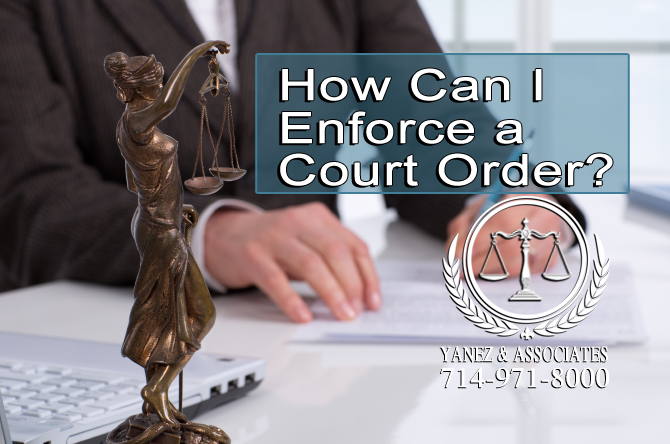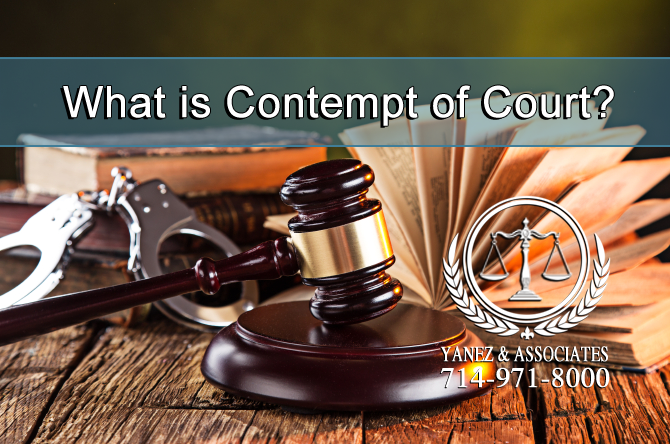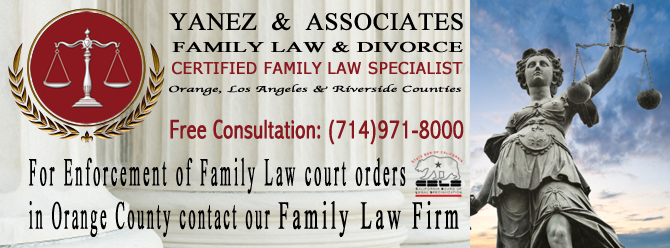Enforcement of Family Law California Court Orders in Orange County & Los Angeles
Enforcement of Family Law court orders in Orange County California: In California, when the court makes a decision regarding a matter in family law, both parties are expected to abide by the court’s decision. But, what happens when one of the parties decides that he or she does not like the decision that the court made, and that they’d rather not follow the court’s ruling?
Family law does not result in one party “winning” and the other party “losing”. Rather, both parties are bound to follow the terms of the agreement. In order to make sure that both parties follow the terms of the agreement, the court signs a court order. One purpose of a court order is that the court can legally enforce it, so that if either party does not follow the terms of the order, the other party has a way to take action.
What is a Court Order?
• A court order can require a person to either perform a specific action, like pay child support;
• A court order can prohibits a person from performing certain actions, like a restraining order that prohibits a restrained person from contacting a protected person;
• A court order can set a specific court date, like when two parties are required to appear in court or exchange children between parents; or
• A court order can legally establish something, like a relationship between parties (marriage, divorce, or legal separation).
A court order can also be legally enforced. This is one of the major benefits to a court order - both parties know that they could potentially face real consequences under the law if they fail to follow the terms of the order.
Different kinds of court orders have different consequences. Failing to follow the terms of a child custody order, for example, could result in losing custody of your child. Failing to pay child support can lead to wage garnishment.
When it comes to family law, the punishment is meant to right a wrong more than it is to punish, but punishment is not unheard of. If you have questions, it is always best to talk to a lawyer. If you don’t believe that the existing court order is fair, you may be able to have it legally modified, but until you do so, you are required to follow the terms of the order.
What Kinds of Court Orders Exist in California?

In Family Law: Restraining Order/Protective Order, Child Custody and Visitation Order, Child Support Order, Spousal or Partner Support Order
There are many types of court orders that a family court may issue in California. Each different court order has a different purpose, a different process for enforcement, and different consequences for failing to abide by its terms. Some of the court orders you that may be issued in California are listed below.
Restraining Order, or Protective Order
Restraining orders, also called protective orders, are meant to protect one party from the other. A protective order may require the restrained party to stay away from the protected party, their home or workplace, it may include child custody or visitation orders, and it may require or prevent the restrained party from other actions.
If a restraining order is violated, the protected party may be in extreme danger.
Child Custody and Visitation Order
A child custody and visitation order is made when a child’s parents cannot agree on how to raise a child or where the child should live. The custody and visitation order determines exactly that - where a child will live and who is responsible for making important decisions regarding the child’s life. A visitation order is often included when it is determined that the child should live with only one parent. A child custody order should always be made based on the child’s best interest.
If a child custody or visitation order no longer serves its purpose or is no longer in the best interest of the child, either party may apply to have it modified. However, if either party fails to follow the terms of the order as it currently exists, the other party can have it enforced in court.
Child Support Order
Child support orders are granted in order to ensure that both parents support a child financially. When a child support order is issued, a wage garnishment is included as part of the order. Two parents can agree to have the wage garnishment stayed, but it can be reinstated at any time.
When one party fails to pay child support on time, in full, or at all, the other party may wish to get legal help in enforcing the order.
Spousal or Partner Support Order
Spousal and partner support may both be issued in a divorce or a legal separation in order to ensure that both parties can maintain a similar standard of living after the divorce or legal separation to what they had during their marriage or registered domestic partnership.
When the party that is required to pay spousal support fails to do so in full, on time, or at all, the other party may enforce the order. Like child support orders, a violation of a spousal or partner support order may result in a wage garnishment.
How Can I Enforce a Court Order?
A restraining order, or protective order, for example, can be quite dangerous when violated. The first step in enforcing a restraining order should be to call the police immediately. Talk to your district attorney or a lawyer, who can help you file a civil contempt action. The violation can result in a fine or jail time for the person who violated it. For more information on contempt, see the section below.
If your safety is at risk, try to be prepared ahead of time. Make sure that important people in your life are aware of the risk and that they have copies of the restraining order if necessary. Let the police in your area know that you have a restraining order.
When a child support, spousal support, or partner support order is violated, a wage assignment or wage garnishment may be obtained. When it comes to child support, California has local child support agencies that can help protect a child’s rights and ensure that he or she has the financial support necessary.
Child custody orders are always made to be in the best interest of the child. If either parent fails to follow the terms of the child custody order, be sure to record the violation. Depending on how the order is violated, your actions may need to vary. A lawyer in your area can help you determine the best course of action.
If you think your child was kidnapped, collect a list of contact information for the other parent and anyone you think he or she may contact. Gather a recent photo, physical description, and other important information about your child and his or her other parent.
If you know where your child is, but you are not being allowed to see him or her, contact an attorney. Do not stop paying child support, do not attempt to see your child when you are not supposed to, and do not stop being available for your scheduled times with your child. You may need to modify and enforce your existing custody order.
What is Contempt of Court?
Holding a person in contempt of court is not the most commonly used method of enforcing a court order, but it is an option. When a person is in violation of a court order, the other party may have the option of holding them in contempt.
In order to enforce a court order through contempt of court, you will need to show the following.
- A court order exists, and was signed by a judge;
- Both parties are aware of the court orders existence and understand its terms;
- The other party willfully violated the court order.
When a person is accused of being in contempt, the process is usually a criminal one, and it can lead to fines and jail time.
Orders that can be punished through contempt of court include the following.
• Failure to follow the terms of a spousal support order,
• Failure to follow the terms of a partner support order,
• Failure to pay attorney’s fees,
• Failure to follow an order to seek work as part of a support order,
• Failure to abide by a wage garnishment on an employee’s wages,
• Violation of a restraining order,
• Failure to abide by the terms of a property division order,
• Failure to abide by the terms of a child custody order,
• Violation of a visitation order,
• Several other orders may be enforced through contempt of court.
For Enforcement of Family Law court orders in Orange County contact our Orange County Enforcement of Court Order Lawyers
If you have questions about enforcing a court order, or if you think that it is time to modify an existing court order, contact an attorney today. The lawyers at Yanez & Associates offer free initial consultations - contact us today to schedule yours.
















